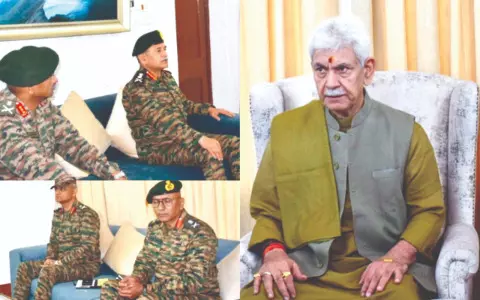
Jammu, April 25 -- In the in the wake of Tuesday's brutal terrorist attack in Pahalgam, South Kashmir - the worst since the 2019 Pulwama massacre, Jammu and Kashmir Lieutenant Governor Manoj Sinha summoned an emergency session of the Union Territory's Legislative Assembly on Monday, April 28. The session, scheduled for 10:30 am in Jammu.
The session has been convened under Section 18(1) of the Jammu and Kashmir Reorganisation Act, 2019. In his official summon, the L-G urged all lawmakers to attend the proceedings, while the Assembly Secretary reinforced the directive, stressing the importance of full participation in the wake of the security crisis.
The Pahalgam attack, which claimed multiple lives, has triggered a strong response from the administration. "Every perpetrator and supporter, irrespective of location or affiliation, will be held accountable," Sinha said, reiterating a policy of zero tolerance towards terrorism.
Earlier on Friday, L-G Sinha chaired a high-level security review meeting in Srinagar with Army Chief General Upendra Dwivedi, Northern Command chief Lt Gen MV Suchindra Kumar, Deputy Chief of Army Staff Lt Gen Pratik Sharma, and GOC 15 Corps Lt Gen Prashant Srivastava.
Describing the assault as "cowardly and dastardly," the LG called for "uncompromising action" against terror networks.
The meeting emphasised tighter coordination between the Army, police, and Central Armed Police Forces (CAPFs), with a focus on intelligence-driven operations to dismantle support systems, including overground workers (OGWs). "The nation has full faith in the bravery of our forces. They must work in close synergy to eliminate perpetrators and enablers," Sinha asserted.
Monday's Assembly session is expected to revolve around urgent security policy discussions and rehabilitation efforts for those affected. Legislators are likely to scrutinise intelligence lapses and evaluate preparedness in vulnerable zones like Pahalgam, a prominent tourist destination. Proposals for enhanced surveillance, inter-agency coordination, and troop deployment are expected to dominate the floor.
Debates may also focus on strengthening legal frameworks to counter emerging threats. This could include fast-tracking trials under anti-terror laws like the UAPA, cracking down on OGW networks, and addressing newer challenges such as drone-dropped weapons and cross-border infiltration.
A resolution seeking increased financial aid and comprehensive rehabilitation for victims' families is also anticipated. Opposition members may question the effectiveness of the UT administration's security strategy post-2019 reorganisation, demanding more transparency in counter-terror operations and stronger civilian protection measures.
The session may explore broader counter-radicalisation efforts, including engaging religious leaders, youth groups, and educational institutions. Economic measures to rebuild trust in affected areas-such as insurance for businesses, security for tourists and pilgrims, and campaigns to revive tourism-are also expected to be proposed.
Published by HT Digital Content Services with permission from Millennium Post.
